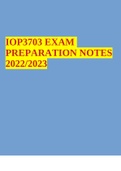IOP3703 EXAM
PREPARATION NOTES
2022/2023
,21st Century Workplace
5 future trends that have a major influence on the 21st Century World of Work - repeated x 4
1. An increasingly ageing yet active population: Lifestyle changes & medical advances are
keeping people alive & fit well into their 90’s, financial pressures & personal desire also keeps
them working
2. More varied household types: the 21st century workforce will increasingly consist of female
heads of households, same-sex partners, stay-at-home fathers, dual-income families and
unmarried couples. Company benefits can include flexibility to retain these varied types
3. Multi-generations working side by side: 5 generations (Silent Generation, Baby Boomers,
Generation X, Baby Boom Echo, and Millennium Generation) will work side by side in the 21st
century workplace. Each generation has its own competing needs, values, expectations &
work styles. Companies can tap into the wisdom & experiences of their older employees & the
energy & stamina of the younger ones to create a powerful multi-generational workforce.
4. Growing diversity in the workplace: The workforce is growing more diverse in terms of race,
ethnicity, nationality, gender, religion & sexual orientation. Successful companies can develop
a corporate culture that embraces their diverse workforce in order to have a productive
structure.
5. Spirituality at work: 21st century workers seek a spiritual component in the workplace which
includes personal growth, balance & meaningful purpose
Implications of the changing organization for careers in the 21st Century repeated x 7
NB!!! This question is also asked as: What is the impact of recent changes in the business
environment on individual careers?
Protean careers
A career shaped and managed by the individual. It consists of all the person’s varied experiences in
education, training, and work in several organisations and changes in occupational field and is
characterised by a high degree of mobility, self-reliance and internal career thinking.
Career management becomes the individual’s responsibility, organisation can only assist. It is a self-
directed approach driven by one’s own values. It is shaped more by the individual than the
organisation and may be redirected from time to time to meet the needs of the person. Contract is
with self and no longer the organisation. Offers three form of flexibility
1. It provides new ways of career thinking. Instead of linear progression the protean concept
suggests a flexible career course where movement between different lines of work are done
2. Flexibility in terms of career space. The space is enlarged allowing for the integration between
work and family issues and are not treated as separate domains.
3. It allows workers to work from home either informally or formally as a home work programme.
Implication: a mixed approach, keeping some elements of the traditional career, will emerge as more
and more careerists become ‘protean’, it is anticipated that the protean group will become larger as
more people adapt to demands of the environment
, Boundaryless careers
A career characterised by flexibility, mobility and movement between different global-organisational
contexts, individuals have self-ownership of their careers, they manage their careers in a relatively
autonomous fashion between jobs, companies and professions, and in the process, their employment
value is increased. Careers cannot be constrained by organisational boundaries. Individuals can
move between different organisations if they have transferable knowledge, skills and abilities.
Implications: in practise the contrast between traditional and boundaryless careers may not be as
clear as in theory. ‘Boundarylessness’ cannot always be applied to all occupations and work settings
– it may be applicable to technical occupations, knowledge and professional occupations and work
settings, but not necessarily to the boundaries that affect middle-managers in medium-sized
organisations..
Composite Careers
Individuals are likely to have more than one working role or holding more than one form of job. People
can no longer afford to limit themselves to only taking or passing up jobs. This composite work-life
forces individuals to manage their own time and efforts. The composite career is a way to express
those parts of one’s multiple possible selves that are excluded from the narrow world of one-job-for-
life.
Implication: workers in the 21st century will stop thinking of themselves as ‘having’ a job but will
increasingly think of themselves as ‘experimenting’ with job opportunities which allow them to
discover more about themselves and live meaningful lives.
Entrepreneurial careers
Self-employment requires a willingness to take action, experiment and constantly innovate.
Self-employed people can be referred to as entrepreneurs.
Choosing self-employment as a career option included establishing and managing one’s own
business. It requires sacrifice, innovation and taking to create something of value to society.
Characteristics of entrepreneurs include need for achievement, autonomy and independence,
flexibility, creativity, self-confidence, high levels of motivation etc. Typical attitudes are internal locus
of control, high level of responsibility, place high value on money and status, creativity and honesty.
Implication: A major challenge is uncertain and uneven cash flows. Proper career planning is critical
in contemplating the entrepreneurial career and achieving the success the one aspires to. Effective
career planning must take into account challenges that one will have to face when pursuing the
entrepreneurial career
Career resilience and career adaptability repeated x 3
Career resilience is described as the ability to adapt to changing circumstances.
Four characteristics are identified as indicators of career resilience:
● Belief in oneself
● A disregard for traditional sources of career success
● Self reliance and
● Receptivity to change
Individuals who are career resilient contribute skills that are aligned with business needs, are
dedicated to continuous learning and committed to personal excellence, have an attitude that is
focused but flexible and their performance is in support of organisational goals.
Career adaptability refers to individuals’ readiness to cope with changing work and working
conditions. Adaptive individuals are proactive by displaying curiosity and exploring possible selves
and future scenarios.




